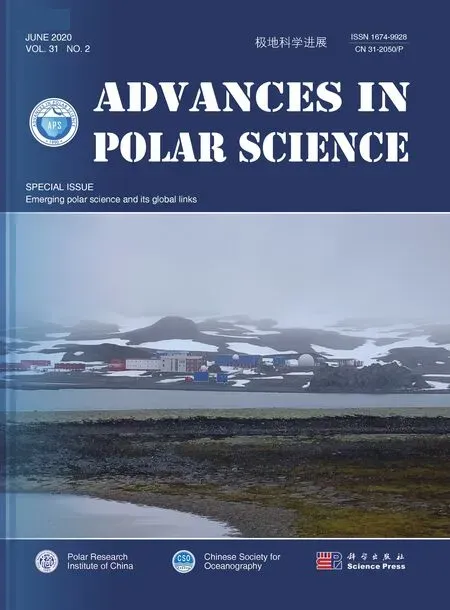Foreword
2020-12-25AzizanAbuSamah,YunusShukor,ClaudioGómez-Fuentes等
Malaysia’s interest in the Antarctic started with diplomacy when Malaysia raised the issue of Antarctica as a global common for mankind in the Question of Antarctica in the United Nations in 1982. It wasonly in 1999 that Malaysia was able to undertake its first scientific expedition to Antarctica courtesy of New Zealand. The Malaysian International Seminar on Antarctica (MISA) is a biennial meeting that was initiated to facilitate cooperation between Malaysian scientists and their international counterparts and also to showcase the research undertaken by them.
Thisspecial issue ofAdvances in Polar Sciencecontains seven selected papers that were presented atMISA8and the two SCAR related workshops, Tropic Antarctic Tele-connection (TATE) and State of the Antarctic Ecosystem (AntEco),whichwere held at the Universiti Putra Malaysia from 18thto 20thof June 2019.It also includes an Opinion Editorial “Arctic Environmental Change Research and Antarctic Studies Have Mutual Benefits”that is related to the main theme of MISA8—Polar Regions in the Global Climate System.
The papers in this special issue cover the major scopeof MISA8except for the keynote addresses. The keynotes were presented by four distinguished researchers. Professor Timothy Nash presented a talk onWhat Does the Paris Agreement Mean for Antarctica and the Southern Oceanwhile Dr. Gwen Fenton spoke onSurviving and Thriving in Antarctica and the Southern Ocean in a Changing World. Professor Akiho Shibata talked aboutFuture and Challenges of Antarctic Governanceswhile Professor Azizan Abu Samah reviewed
the Malaysian Antarctic Research Program on Antarctic Weather and Climate and its Teleconnection to the Tropics. The seminar and workshop were a success and were attended by more than 200 participants comprising postgraduate students and Malaysian polar researchers plus a number of international researchers: some physically at the meeting and others via video conferencing. A total of 43 papers were presented at this meeting covering the areas of Antarctic governance, and physical and microbiological research in the Antarctic.
The seven MISA8 articles cover the fields of atmospheric and environmental sciences, and research on Antarctic micro-organisms. One article presents observations of surface ozone variations at the Great Wall Station, Antarctica during austral summer while another evaluates tropical-Antarctic connections of an explosive cyclone in southern Brazil based on rainfall isotope ratios and synoptic analysis.Two papers consider the effects of a changing environment on polar microalgae: the toxic impacts on microalgae of oxybenzone, an ultraviolet filter introduced into Antarctica in sunscreens; and the impact of warming temperatures on the physiological and photosynthetic performance of two polarChlorellasp.The three remaining contributions cover further aspects of research on Antarctic microorganisms.These are on the efficacy of the bacteriumRhodococcussp. for bioremediation of fuel spills that are also contaminated with heavy metals; the structure and function of the cold shock domain (CSD)-containing proteinfrom a psychrophilic yeast,Glaciozyma antarctica; and the genome of an Antarctic thermophilic bacterium,Geobacillussp.
The meeting organizer would like to thank the sponsors of this meeting,particularly the Universiti Putra Malaysia, the Sultan Mizan Antarctic Research Trust, SCAR and the other local universities that cannot all be named due to limited space in this foreword.
We would also like to thank the journalAdvances in Polar Sciencesfor publishing this special issue.Finally, we would like to thank the seminar participants, and the authors and reviewers, for their contributions to MISA8 and this issue.
Guest Editors
Azizan Abu Samah, Yunus Shukor, Claudio Gómez-Fuentes and Ian Allison
杂志排行
Advances in Polar Science的其它文章
- Information for authors
- Arctic envir onmental change r esearch and Antar ctic studies have mutual benefits
- Genome of a thermophilic bacterium Geobacillus sp. TFV3 from Deception Island, Antarctica
- Structure and function of a novel cold r egulated cold shock domain containing pr otein fr om an obligate psychrophilic yeast, Glaciozyma antarctica
- The growth of the Rhodococcus sp. on diesel fuel under the effect of heavy metals and differ ent concentrations of zinc
- Effects of elevated temperatur es on gr owth and photosynthetic performance of polar Chlorella
